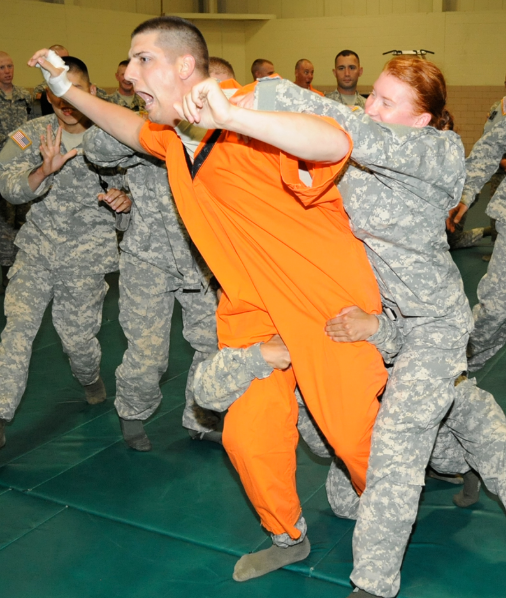Army Internment/Resettlement Specialists (MOS 31E) are responsible for the operation and safety in a confinement/correctional or a detention/internment facility.
These specialists play a similar role to civilian and corrections officers in other military branches, such as a Marine Corps Correctional Specialist.
Their job duties consist of supervising and assisting prisoners and internees.
Related Article – Complete List of All Army MOS’s
Qualifications,Training and Duty Stations
This is an entry-level position that requires secret security clearances.
In order to serve in this position, recruits must achieve a score of at least 95 on the Skilled Technical (ST) portion of the ASVAB test.
After completing all testing and physical/medical requirements, recruits will attend 10 weeks of Basic Combat Training at one of four U.S. Army posts.
When Basic Combat Training is successfully completed, recruits will complete seven weeks of Advanced Individual Training (AIT).
AIT will consist of a combination of on-the-job classroom and in the field training.
The training will cover everything from laws to practicing procedures.
Skills that are helpful in this MOS include:
- Ability to remain calm in stressful situations and make quick decisions
- Interest in a job involving law enforcement
- Being physically and mentally fit
Related Article – Army Firefighter (MOS 12M): Career Details
Duty Stations
Those serving in the Army as an MOS 31E can expect to be potentially based at one of the following duty stations:
Inside the Continental US (CONUS)
- Ft. Belvoir, VA
- Ft. Bragg, NC
- Ft. Hood, TX
- Ft. Leavenworth, KS
- Ft. Lewis, WA
- Ft. Miramar
Outside the Continental US (OCONUS)
- Cuba
- Garmisch, Germany
- Sembach, Germany
- Honolulu, Hi
- Shafter, Italy
- Humphreys, South Korea
What are the Job Functions of an Internment/Resettlement Specialist?
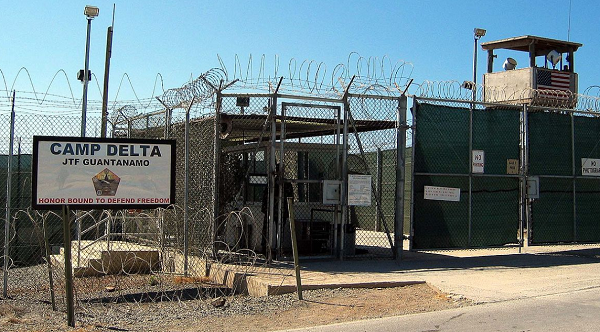
Internment/Resettlement Specialists are responsible for the supervision of both confinement and detention operations.
They are required to know Military laws and jurisdictions.
Having communication skills help in this position because it allows for providing clear direction to detainees as well as communication with other staff.
Specialists provide external security to facilities.
They supervise prisoners/internees in their recreational, work and living areas, both in and outside of the facility.
MOS 31E specialists always stride toward humane treatment and work towards returning the prisoners/detainees to a productive life.
The Specialist will be required to brief them of their rights when they go through the intake process.
They keep detailed records/reports of prisoners/internees, their programs, behaviors, and any disciplinary actions.
Part of this position is to perform search procedures.
Search procedures can include an initial pat-down during intake procedures to checking a room/person for contraband.
Specialists are required to know the correct procedures, the rights of the individual, as well as how to correctly collect their search findings.
They will be skilled in de-escalation as well as hands-on training.
Anyone who has ever worked in a detention setting can attest to prisoners/detainees attempting to manipulate you or get under your skin.
Prisoners in the Army are no different and may even be better at it.
This position requires individuals to have “tough skin” and be professional in all scenarios.
Related Article – Army Military Police (MOS 31B): Career Details
Having insults and conflict with prisoners is something that is practiced during training to ensure guards are ready.
In addition to search skills, the specialist will also know proper restraining procedures and custody/control procedures.
Tools that assist in these skills include handcuffs and waist restraints.
Daily duties may include intake and release procedures, monitoring prisoners/internees through camera and in-person checks, and providing counseling/guidance to prisoners within a rehabilitative program.
As part of these duties, a specialist must know how to inventory personal and military belongings, take photographs and fingerprints, and issue room assignments and personal items.
They will also be required to conduct prisoner formations and roll calls.
This position is important in a deployment scenario because they will be some of the very few who are properly trained to work with detainees in a deployed environment.
When not in a deployed scenario, 31E Soldiers are generally assigned to military prison duty stations.
The US Army recruiting video below provides more information into MOS 31E.
What Does an Internment/Resettlement Specialist get Paid?
While you cannot say exactly what a recruit in this position will make, you can estimate base pay figuring in rank and time of service.
With no prior military experience and higher education, individuals looking to be recruited into this position can expect to make around $20,000 a year.
This income will be slightly less during the first four months and will increase as rank increases.
In addition to the base pay outlined in the table below, benefits are available, as well as bonuses for certain positions and meeting special recruiting timelines.
| Insignia | Pay Grade | Rank | Abbreviation | Minimum Monthly Pay |
|---|---|---|---|---|
| E-1 +4 months | Private | PVT | $1,917.60 | |
| E-2 | Private Second Class | PV2 | $2,149.20 | |
| E-3 | Private First Class | PFC | $2,259.90 | |
| E-4 | Specialist | SPC | $2,503.50 | |
| E-4 | Corporal | CPL | $2,503.50 | |
| E-5 | Sergeant | SGT | $2,730.30 | |
| E-6 | Staff Sergeant | SSG | $2,980.50 | |
| E-7 | Sergeant First Class | SFC | $3,445.80 | |
| E-8 | Master Sergeant | MSG | $4,957.20 | |
| E-8 | First Sergeant | 1SG | $4,957.20 | |
| E-9 | Sergeant Major | SGM | $6,055.50 | |
| E-9 | Command Sergeant Major | CSM | $6,055.50 | |
| E-9 | Sergeant Major of the Army | SMA | $6,055.50 |
Related Article –Army Infantryman (MOS 11B)
Benefits
Most Army benefits are provided to soldiers for free or for very low cost in comparison to civilian plans.
The Army provides housing and food for those living on-base.
They also provide an annual clothing allowance and special pay situations (such as deployment).
Medical and dental insurance are available, plus low-cost life insurance, paid sick time, and paid vacation.
Education tuition assistance programs allow most soldiers to get advanced education at zero to low-cost.
Job Reviews
Job reviews of this position can be back and forth.
Some reviews are very positive including discussing being able to work indoors and generally having set hours.
Negative reviews discuss job assignments and deployments.
Related Article – Basic Allowance For Housing (BAH) Calculator
Most of the reviews of the position were positive and describe how the job functions you do on a daily basis directly relate to a civilian law enforcement career.
A few job reviews can be found below.
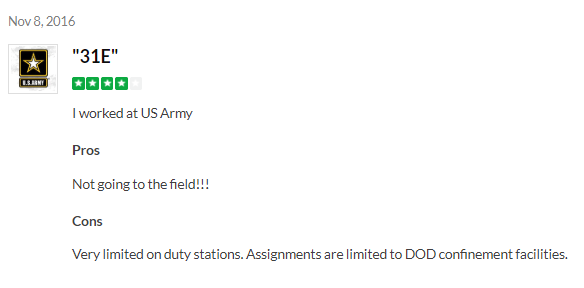
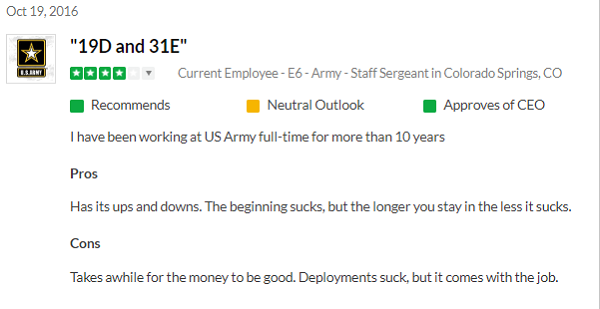
Related Article-Army Combat Engineer (MOS 12B)
Civilian Career Opportunities
Working in this MOS provides training for law enforcement positions as a civilian.
Skills learned allow for a career as a Correctional Officer or Jailer, a Security Guard or Security Manager.
With some additional training, the Internment/Resettlement Specialist can work as a Probation or Parole officer and as a Correctional Treatment Specialist.
The Army will provide training towards certificates such as Certified Corrections Officer (CCO) from the American Correctional Association.
Working to get certifications while in the Army allows for promotions while in the Army and transferable certifications as a civilian.
This MOS assists with civilian employment through the PAYS (Partnership for Youth Success) program.
This recruiting program guarantees an interview with one of the military-friendly employers participating in the program, such as LAPD, Kansas Highway Patrol, and more law enforcement agencies.
Summary
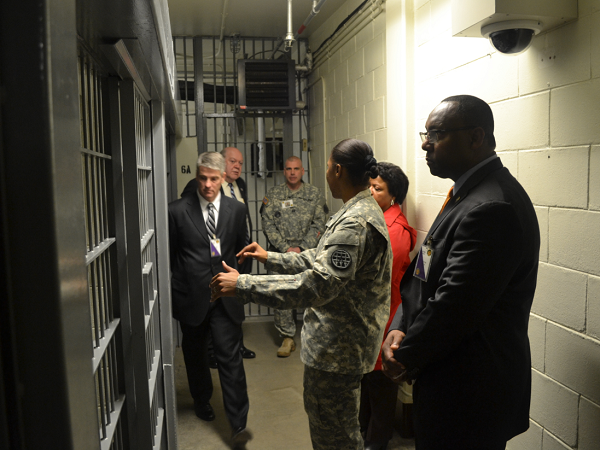
Internment/Resettlement Specialist s(MOS 31E) supervise and assist individuals in confined and detention operations.
They are in charge of completing intake/release procedures, restraining individuals, and providing guidance to prisoners in treatment or other rehabilitative programs.
This position is entry-level and follows the base pay table with additional benefits and compensation.
To enter into this MOS recruits, must take the ASVAB test and pass all physical/medical requirements.
Reviews of this position were mixed but were mostly positive.
This position directly relates to law enforcement civilian career opportunities such as patrol or corrections.
Related Article-Army Criminal Investigations Special Agent (MOS 31D): Career Details
References:
- 68 Series MOS: A List of Medical Field Jobs in the Army - June 19, 2024
- 15 Series MOS: US Army Aviation Jobs - June 19, 2024
- 11 General Orders For Each Military Branch - June 19, 2024
General FAQ
What does an Army Internment/Resettlement Specialist do?
An Army Internment/Resettlement Specialist (MOS 31E) is a specialist in correctional operations, dealing primarily with detention and internment facilities.
Where do Army MPs go to basic training?
Where do Army MPs go to basic training? For an Army Internment/Resettlement Specialist, both Basic Combat Training and Advanced Individual Training are held at Fort Leonard Wood in Missouri. Basic is 10 weeks long, and AIT is 8 weeks.
What ASVAB scores do you need for Army Internment/Resettlement Specialist (MOS 31E)?
To enter the 31E career field, you’ll need to score a minimum score of 95 on the Skilled Technical portion of the Armed Forces Vocational Aptitude Battery.
What jobs can Internment/Resettlement Specialists do after the Army?
Those in the military police career field have the option of interviewing with a wide range of police departments across the country through the PAYS (Partnership for Youth Success Program).
Where do MOS 31Es get stationed?
Most Army Internment/Resettlement Specialists will be assigned to duty stations with military prisoners, such as Fort Leavenworth, Kansas, Guantanamo Bay, Cuba, and Fort Humphreys in South Korea.

